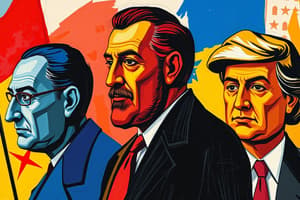Podcast
Questions and Answers
What is one key characteristic of legitimate authority?
What is one key characteristic of legitimate authority?
- It is based on personal connections.
- It enforces strict obedience without question.
- It is widely accepted by citizens. (correct)
- It is determined by wealth and power.
Which of the following methods is associated with discovering the truth in political theory?
Which of the following methods is associated with discovering the truth in political theory?
- Discovery of the truth (correct)
- Mathematical modeling
- Empirical observation
- Historical analysis
What is the primary goal of Critical Theory in political thought?
What is the primary goal of Critical Theory in political thought?
- To promote traditional values
- To enhance governmental control
- To achieve emancipation (correct)
- To establish solid political structures
What does normative theory primarily seek to understand?
What does normative theory primarily seek to understand?
What is a crucial element that counts as high quality academic work?
What is a crucial element that counts as high quality academic work?
How do critical theorists approach the issue of domination?
How do critical theorists approach the issue of domination?
Which thinker is associated with the concept of 'social contract' as a basis for legitimate authority?
Which thinker is associated with the concept of 'social contract' as a basis for legitimate authority?
What type of questions are primarily posed in political theory?
What type of questions are primarily posed in political theory?
Flashcards
Legitimate Authority
Legitimate Authority
The idea that those in power have a legitimate right to rule, and citizens have a duty to obey.
Socrates’ Paradox in the Crito
Socrates’ Paradox in the Crito
A philosophical paradox by Socrates questioning whether one should always obey the law even if it's unjust.
Normative Theory
Normative Theory
Focuses on understanding and explaining what morality demands.
Critical Theory
Critical Theory
Signup and view all the flashcards
Interpretation
Interpretation
Signup and view all the flashcards
Discovery of the Truth
Discovery of the Truth
Signup and view all the flashcards
Invention through Contrivance
Invention through Contrivance
Signup and view all the flashcards
Interpretation of the Meaning of the World
Interpretation of the Meaning of the World
Signup and view all the flashcards
Study Notes
Introduction to Politics: Political Ideologies - An Introduction to Political Theory
- Course name: SP1125 Introduction to Politics
- Course topic: Political Ideologies
- Course description: An introduction to political theory
What do students of political theory learn?
- Students learn the types of questions posed in political theory.
- Students learn the types of methods used in political theory.
- Students learn about the major schools of thought in political theory.
- Students learn the characteristics of high-quality academic work in political theory.
What kinds of questions are posed?
- Legitimate authority: Those in power claim the right to rule and expect citizens to obey.
- However, individuals must be able to balance obeying authority with ensuring their freedom.
- For example, Socrates' paradox in the Crito exemplifies this tension.
- Example: Legitimate authority
- What makes authority legitimate (e.g., democracy)?
- What does legitimacy entail (e.g., deference)?
- Can lessons be learned from classic texts like Plato's Crito, Hobbes' Leviathan?
- What current issues exist (e.g., dissent, populism)?
- Is there a legitimate authority?: Some anarchists argue against the concept of legitimate authority.
- Mikhail Bakunin (1814-1876) is an example of an anarchist thinker.
What kinds of method are used?
- Discovery of the truth: Aims to discover truths about human nature and society (e.g., that humans are autonomous).
- Invention through contrivance: Develops concepts or structures to address political issues often via philosophical arguments (e.g., Social Contract).
- Interpretation: Examines the meaning of the world (e.g., liberal politics can be seen as justified now).
What are the main schools of thought?
- Critical Theory: Focuses on emancipation from societal problems.
- Methodology involves critiquing existing ideas that hinder emancipation.
- The problem of domination - how ideas and power structures contribute to domination, needs analysis.
- Karl Marx (1818-1883) is an example.
- Normative Theory: Tries to understand morality and what moral demands society should consider.
- Methodology involves an open approach to falsification, examining the consequences of viewpoints, and considering fundamental philosophical issues.
- Judith Shklar (1928-1992) could be considered an example.
What counts as high-quality academic work?
- Expression: Clear, precise, and persuasive writing.
- Argument/Analysis: True premises are used to support sound conclusions.
- Engagement with Published Work: Critique (exegesis), and detailed analysis of existing academic work.
- Structure: Purpose, linkage of ideas, and well-justified conclusions are conveyed.
- Example aspects of an argument:
- Autonomy: The ability to self-govern.
- Authority: The right to command and a duty to obey.
- Conflict: Incompatibilities between autonomy and authority, and the need to oppose authority.
Studying That Suits You
Use AI to generate personalized quizzes and flashcards to suit your learning preferences.




